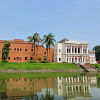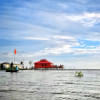Enable pro-poor spending for inclusive growth

It is now widely recognised that growth led by domestic demands has been complementing export-led growth strategies for a sustained high growth in Bangladesh for more than a decade. The domestic demand-led growth is spurred by high consumer spending and strong responses from domestic firms by producing a wide range of consumer durables and services. The burgeoning middle and upper-middle classes as well as the rich in the country are now spending more on consumer durables and enjoying more leisure than ever. Each year, we see millions thronging the sea beaches of Cox's Bazar. They are not the same people visiting the same places every year. A new generation of spenders is added to the stock each year who can afford holidays in Cox's Bazar. This can be a good indicator of the rise of disposable income.
While the spending of the affluent class has cascading effects to generate income for many, there are scopes for making the impact of that spending broader, steering benefits to trickle down to the bottom.
Anecdotal evidence and casual observations suggest that Bangladeshis spend more than those in our neighbouring countries, for a given level of income. The urban rich class is now driving larger cars (we see more SUVs and hatchbacks crowding Dhaka streets), living in bigger houses (sales of single-unit houses and luxurious apartments are on the rise), and enjoying holidays abroad. These spenders don't go to Cox's Bazar anymore, finding luxury resorts in the country tailored more to their taste. The urban elites are now looking for rural respite – building bungalows in the countryside, enjoying boat rides, and relishing local foods. How these rich people spend money in the country, particularly on a holiday, has a profound impact on the country's growth and distribution of income. The size of this rich class is no longer small.
This spending of the richer class can be guided to make it more pro-poor. There is a powerful concept in economics called the "multiplier effect." According to this concept, speaking Tk 1 extra ultimately leads to more than Tk 1 of overall increase in income through multiple rounds of spending, as one's spending is the other's income. This spending multiplier can be made more inclusive – touching upon the lives and livelihoods of a larger number of poorer people. One can think of the differential impacts of spending Tk 5,000 on eco-tourism in Bandarban or Bhurungamari as opposed to spending the same amount for a dinner at a five-star hotel in Dhaka.
Note that this multiplier effect is different from the supply chain effect, which happens when the income of the participants along a supply chain is raised. The spending of the rich can promote more inclusive supply chains where the participants in the downstream – i.e. growers and small traders – will be equally benefited. Spending Tk 5,000 in Bhurungamari can raise the income of local growers, traders, shop-owners, rickshaw or van pullers, and a wide range of local service providers. Many local occupations may emerge out of the spending of the rich.
While the spending of the affluent class has cascading effects to generate income for many, there are scopes for making the impact of that spending broader, steering benefits to trickle down to the bottom.
It is important to understand the spending behaviour of the upper-middle and rich classes – where they spend and what they want to spend on. As mentioned above, the rich are building country houses, but largely in their ancestral homes. Soon, there will be high demand for developed land overlooking water bodies (rivers, beels, and haors) in rural or semi-rural areas. As we know, Gulshan and Baridhara have been the ultimate destination of residence for the rich people in Dhaka city. But the elite or super-rich may want to move farther. I believe this superrich class will first move to the countryside, to be followed by others.
This can be the game-changer that can drastically reshape the landscape of rural or semi-rural areas. This transformation should be facilitated and dealt with caution so that this change benefits the local people. Policymakers should be aware of such changes.
Government policies and initiatives should aim at making richer people – the people with large disposable income – spend in such a way that both the multiplier effects and supply chain effects become more inclusive and a larger number of poorer people get benefited. This may involve both supply- and demand-side interventions. Each water body or river is unique and can be turned into an aesthetic and exotic tourist spot. Architects, urban planners, and other professionals who study "spaces" have critical roles to play.
The government should encourage competition among districts for attracting tourists as well as for drawing in the rich to invest in "second homes" in the countryside. On the demand side, awareness should be built for "responsible" consumption. Though this responsibility is now meant solely for the environment, the meaning of this term should be broadened to include pro-poor spending.
Understanding the spending patterns of the country's citizens has profound implications for the tourism development plan in the country. Bangladesh is now in the process of crafting a tourism master plan. Its ultimate goal should be to make richer people spend within the country for higher pro-poor growth.
Dr Kazi Iqbal is senior research fellow at Bangladesh Institute of Development Studies (BIDS).

 For all latest news, follow The Daily Star's Google News channel.
For all latest news, follow The Daily Star's Google News channel. 










Comments